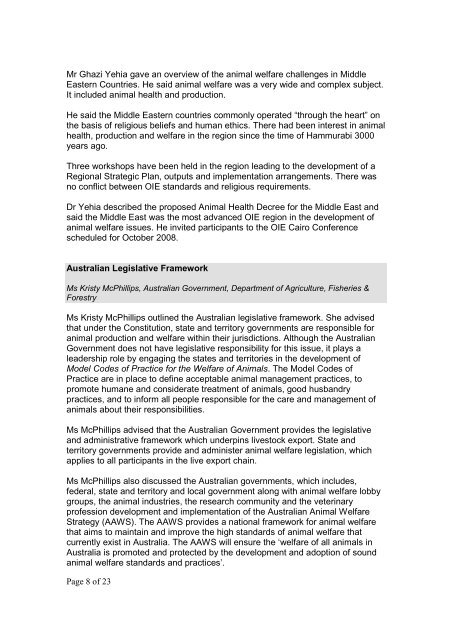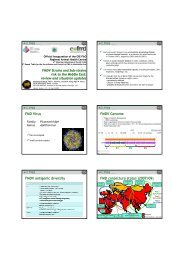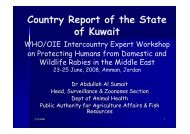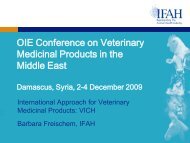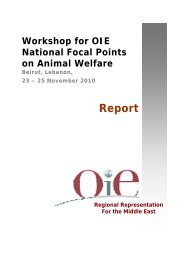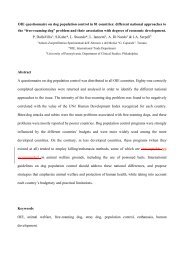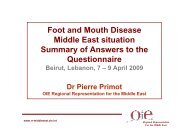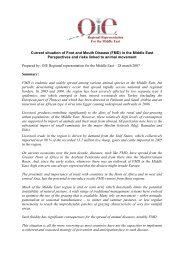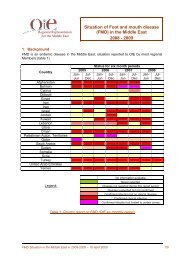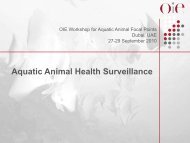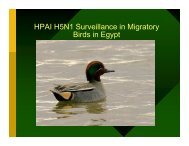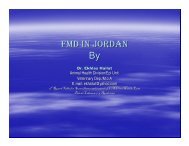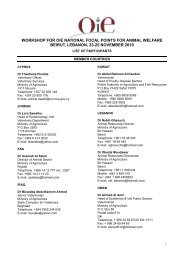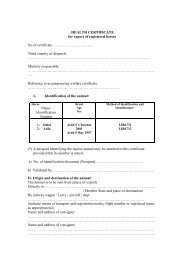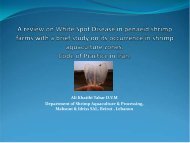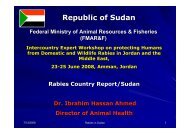d- Animal Welfare Workshop - Middle East - OIE
d- Animal Welfare Workshop - Middle East - OIE
d- Animal Welfare Workshop - Middle East - OIE
Create successful ePaper yourself
Turn your PDF publications into a flip-book with our unique Google optimized e-Paper software.
Mr Ghazi Yehia gave an overview of the animal welfare challenges in <strong>Middle</strong><br />
<strong>East</strong>ern Countries. He said animal welfare was a very wide and complex subject.<br />
It included animal health and production.<br />
He said the <strong>Middle</strong> <strong>East</strong>ern countries commonly operated “through the heart” on<br />
the basis of religious beliefs and human ethics. There had been interest in animal<br />
health, production and welfare in the region since the time of Hammurabi 3000<br />
years ago.<br />
Three workshops have been held in the region leading to the development of a<br />
Regional Strategic Plan, outputs and implementation arrangements. There was<br />
no conflict between <strong>OIE</strong> standards and religious requirements.<br />
Dr Yehia described the proposed <strong>Animal</strong> Health Decree for the <strong>Middle</strong> <strong>East</strong> and<br />
said the <strong>Middle</strong> <strong>East</strong> was the most advanced <strong>OIE</strong> region in the development of<br />
animal welfare issues. He invited participants to the <strong>OIE</strong> Cairo Conference<br />
scheduled for October 2008.<br />
Australian Legislative Framework<br />
Ms Kristy McPhillips, Australian Government, Department of Agriculture, Fisheries &<br />
Forestry<br />
Ms Kristy McPhillips outlined the Australian legislative framework. She advised<br />
that under the Constitution, state and territory governments are responsible for<br />
animal production and welfare within their jurisdictions. Although the Australian<br />
Government does not have legislative responsibility for this issue, it plays a<br />
leadership role by engaging the states and territories in the development of<br />
Model Codes of Practice for the <strong>Welfare</strong> of <strong>Animal</strong>s. The Model Codes of<br />
Practice are in place to define acceptable animal management practices, to<br />
promote humane and considerate treatment of animals, good husbandry<br />
practices, and to inform all people responsible for the care and management of<br />
animals about their responsibilities.<br />
Ms McPhillips advised that the Australian Government provides the legislative<br />
and administrative framework which underpins livestock export. State and<br />
territory governments provide and administer animal welfare legislation, which<br />
applies to all participants in the live export chain.<br />
Ms McPhillips also discussed the Australian governments, which includes,<br />
federal, state and territory and local government along with animal welfare lobby<br />
groups, the animal industries, the research community and the veterinary<br />
profession development and implementation of the Australian <strong>Animal</strong> <strong>Welfare</strong><br />
Strategy (AAWS). The AAWS provides a national framework for animal welfare<br />
that aims to maintain and improve the high standards of animal welfare that<br />
currently exist in Australia. The AAWS will ensure the ‘welfare of all animals in<br />
Australia is promoted and protected by the development and adoption of sound<br />
animal welfare standards and practices’.<br />
Page 8 of 23


